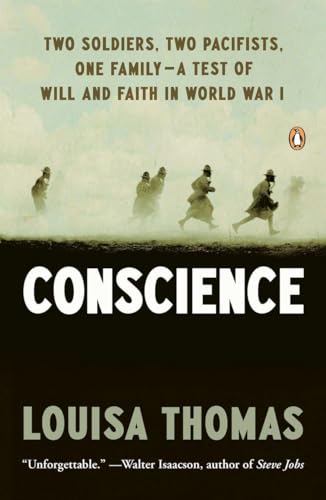Items related to Conscience: Two Soldiers, Two Pacifists, One Family--a...
Conscience: Two Soldiers, Two Pacifists, One Family--a Test of Will andFaith in World War I - Softcover

Synopsis
It was a time of testing and uncertainty. Even before World War I, there was a sense that country was changing. As Louisa Thomas reveals in Conscience, for the Thomas brothers, the struggle did not only take place on the battlefields. It was within themselves. Sons of a Presbyterian minister and grandsons of missionaries, the brothers shared a rigorous moral code, Princeton educations, and a faith in the era’s spirit of hope. Their upbringing prepared them for a life of service, but the war challenged their notions of citizenship, faith, and freedom and threatened to tear their family apart. Centered around the life of the oldest, Norman Thomas, Conscience tells the story of four brothers, and the choices they made.
When the United States entered the Great War, Ralph Thomas enlisted right away, heeding President Woodrow Wilson’s call to fight for freedom. A captain in the Army Corps of Engineers, he would be wounded in France. Arthur, the youngest, was less certain about the righteousness of the cause but was sensitive to his obligation as a citizen—and like so many men eager to have a chance to prove himself. Evan became a conscientious objector, protesting conscription; when the truce was signed on November 11, 1918, he was in solitary confinement. Norman Thomas was a Presbyterian minister when the war began. Before the United States entered the war, he became a pacifist, and by the time it was over, he was a Socialist. He would go on to run for President six times on the Socialist ticket. The Thomas brothers argued about what was possible and what was principled, what was right and what was wrong—and they told each other to have courage. .
Conscience moves from the gothic buildings of Princeton to the tenements of New York City, from the West Wing of the White House to the battlefields of France, tracking four young men navigating upheaval. In telling the story of their journeys, Thomas recovers a way of talking about personal liberty and social obligation, about being true to oneself and to one another.
"synopsis" may belong to another edition of this title.
About the Author
Louisa Thomas has written for the New York Times Book Review, Newsweek, Vogue, and other publications. She lives in New York. Norman Thomas was her great-grandfather.
"About this title" may belong to another edition of this title.
FREE shipping within U.S.A.
Destination, rates & speedsSearch results for Conscience: Two Soldiers, Two Pacifists, One Family--a...
Conscience: Two Soldiers, Two Pacifists, One Family--a Test of Will andFaith in World War I
Seller: World of Books (was SecondSale), Montgomery, IL, U.S.A.
Condition: Acceptable. Item in good condition. Textbooks may not include supplemental items i.e. CDs, access codes etc. Seller Inventory # 00064860210
Quantity: 2 available
Conscience: Two Soldiers, Two Pacifists, One Family--a Test of Will andFaith in World War I
Seller: Wonder Book, Frederick, MD, U.S.A.
Condition: Good. Good condition. With remainder mark. A copy that has been read but remains intact. May contain markings such as bookplates, stamps, limited notes and highlighting, or a few light stains. Seller Inventory # J04A-05726
Quantity: 1 available
Conscience: Two Soldiers, Two Pacifists, One Family--a Test of Will andFaith in World War I
Seller: Wonder Book, Frederick, MD, U.S.A.
Condition: As New. Like New condition. With remainder mark. A near perfect copy that may have very minor cosmetic defects. Seller Inventory # H16M-00818
Quantity: 1 available
Conscience: Two Soldiers, Two Pacifists, One Family--A Test of Will Andfaith in World War I
Seller: ThriftBooks-Atlanta, AUSTELL, GA, U.S.A.
Paperback. Condition: Fair. No Jacket. Readable copy. Pages may have considerable notes/highlighting. ~ ThriftBooks: Read More, Spend Less. Seller Inventory # G0143120999I5N00
Quantity: 1 available
Conscience: Two Soldiers, Two Pacifists, One Family--A Test of Will Andfaith in World War I
Seller: ThriftBooks-Dallas, Dallas, TX, U.S.A.
Paperback. Condition: Very Good. No Jacket. May have limited writing in cover pages. Pages are unmarked. ~ ThriftBooks: Read More, Spend Less. Seller Inventory # G0143120999I4N00
Quantity: 1 available
Conscience: Two Soldiers, Two Pacifists, One Family--A Test of Will Andfaith in World War I
Seller: ThriftBooks-Atlanta, AUSTELL, GA, U.S.A.
Paperback. Condition: Very Good. No Jacket. May have limited writing in cover pages. Pages are unmarked. ~ ThriftBooks: Read More, Spend Less. Seller Inventory # G0143120999I4N00
Quantity: 1 available
Conscience : Two Soldiers, Two Pacifists, One Family--A Test of Will AndFaith in World War I
Seller: Better World Books, Mishawaka, IN, U.S.A.
Condition: Very Good. Reprint. Former library book; may include library markings. Used book that is in excellent condition. May show signs of wear or have minor defects. Seller Inventory # 18351584-75
Quantity: 2 available
Conscience: Two Soldiers, Two Pacifists, One Family--a Test of Will andFaith in World War I
Seller: The Book Cellar, LLC, Nashua, NH, U.S.A.
paperback. Condition: Very Good. Great used condition. A portion of your purchase of this book will be donated to non-profit organizations.Over 1,000,000 satisfied customers since 1997! Choose expedited shipping (if available) for much faster delivery. Delivery confirmation on all US orders. Seller Inventory # 10835292
Quantity: 1 available
Conscience: Two Soldiers, Two Pacifists, One Family--a Test of Will andFaith in World War I
Seller: WorldofBooks, Goring-By-Sea, WS, United Kingdom
Paperback. Condition: Fair. A readable copy of the book which may include some defects such as highlighting and notes. Cover and pages may be creased and show discolouration. Seller Inventory # GOR013290694
Quantity: 1 available
Conscience Two Soldiers, Two Pacifists, One Family--a Test of Will andFaith in World War I
Seller: Readers Cove Used Books & Gallery, DEMING, NM, U.S.A.
Paperback. Condition: Very Good. Matte pictorial covers, solid binding. Minimal wear. Clean unmarked pages. ; 8.35 X 5.43 X 0.79 inches; 336 pages. Seller Inventory # 14197
Quantity: 1 available

